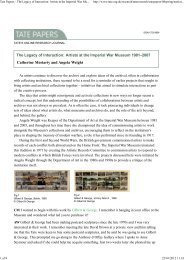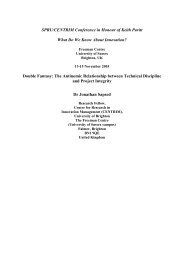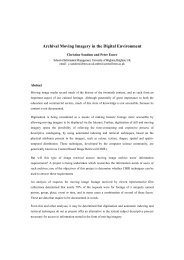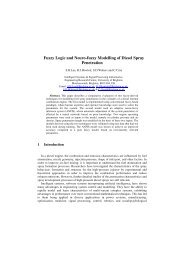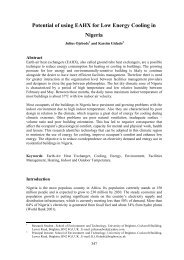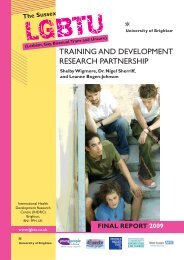TOP TIP - University of Brighton Repository
TOP TIP - University of Brighton Repository
TOP TIP - University of Brighton Repository
You also want an ePaper? Increase the reach of your titles
YUMPU automatically turns print PDFs into web optimized ePapers that Google loves.
It is likely that the best arrangement is<br />
probably to have both male and female<br />
workers co-operating and engaging<br />
with, and available to, young fathers<br />
(Burgess and Bartlett, 2004). Indeed,<br />
DVD in Rotherham emphasised that<br />
having male and female workers can<br />
be useful in that it gives young fathers<br />
the choice <strong>of</strong> who supports them, but<br />
also allows modelling <strong>of</strong> male/female<br />
co-operation which some families may<br />
not have witnessed.<br />
We also asked projects and<br />
organisations about the role a worker’s<br />
ethnicity might play in their work with<br />
young fathers. Responses were along<br />
similar lines to that <strong>of</strong> gender, in that it<br />
was a worker’s skills and attitudes that<br />
were more important than ethnicity<br />
per se (see also ContinYou, 2005a,<br />
2005b; Lloyd, 2001). However, two<br />
projects specifically reported that the<br />
ethnicity <strong>of</strong> young fathers workers had<br />
been an important factor in recruiting<br />
and engaging Asian young men in their<br />
local areas. For example, workers<br />
from Upfront and West Bowling Sure<br />
Start in Bradford, told us that being<br />
Learning Points<br />
South Asian in an area with a large<br />
Pakistani and Bangladeshi population<br />
had been key in developing<br />
relationships with young men and<br />
understanding the cultural barriers<br />
preventing some young fathers from<br />
accessing services. Language skills (e.g.<br />
the ability to speak Urdu, Punjabi, as<br />
well as English), knowledge <strong>of</strong> local<br />
communities and religions, and<br />
understanding <strong>of</strong> cultural sensitivities<br />
were all thought to be central in<br />
developing and delivering services, and<br />
helping young fathers to access these<br />
services.<br />
The boys2MEN project has<br />
emphasised the benefits having suitably<br />
experienced African Caribbean workers<br />
brings to work with black young<br />
people including ‘positive rolemodelling’.<br />
Indeed, the Top Dads<br />
Project in Birmingham (Mordaunt,<br />
2005) attributed its success in<br />
engaging African-Caribbean young<br />
men as largely being due to the<br />
personal credibility <strong>of</strong> the project<br />
worker, a prominent figure in the local<br />
African-Caribbean community.<br />
PROMISING PRACTICE<br />
✱ The specific influences gender and ethnicity may have in terms <strong>of</strong> engaging and delivering support for young fathers, are likely to be<br />
complex. In some cases, it may be helpful to strategically recruit staff in order to take such factors into account. For example, projects<br />
and services in Lewisham and Bradford have both emphasised strongly the positive impacts worker gender and ethnicity can have on<br />
the success <strong>of</strong> engaging with young fathers and young men.<br />
✱ The implicit assumption that practitioners working with young fathers should be male (including dedicated fathers workers), needs to<br />
be challenged. Although having a male presence can be very beneficial, and in some cases desirable (e.g. help to keep a focus on<br />
key issues for young fathers), this does not mean that women cannot, and do not work successfully with young men on fathering<br />
issues. Indeed, some <strong>of</strong> the most successful work with young fathers has been undertaken by women, and it is important to<br />
appreciate that female staff do not need to ‘wait for a man’ before engaging with fathers (Burgess, 2006b).<br />
✱ Ethnicity appears to be significant when it comes to reaching young men from BME groups. Skilled workers from similar ethnic<br />
backgrounds may appear to be more approachable in the first instance to the young men. The worker’s cultural knowledge and<br />
understanding may also enable him or her to ‘connect’ more easily with young people from minority ethnic groups.<br />
Supporting Young Fathers 41



